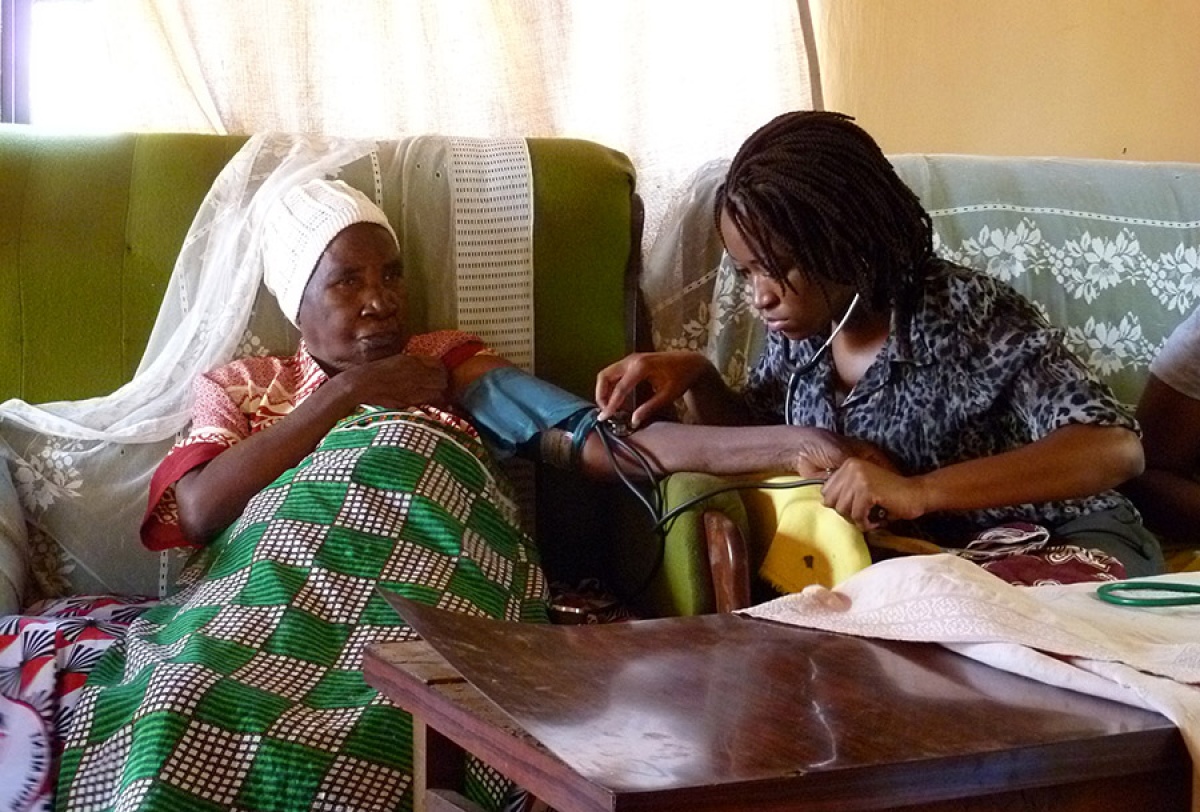Malawian Med Student: 'Global Health Brought Out the Activist in Me'
Posted on Aug 20, 2015

Ndifanji Melia Namacha, 22, is completing her final year of medical school in the College of Medicine at the University of Malawi. Last fall she finished a family medicine rotation in Neno, a remote rural district where Partners In Health works. Here she shares her thoughts and experiences—the beginning, she says, of a medical career devoted to global health.
For my family medicine rotation I decided to go to Neno, where I had never been before. Everyone I asked about it said, “It’s in the middle of nowhere.” Although it required some bravery to go, for me, this is what medicine is about—providing care where nobody else does. My time in Neno was a major stepping-stone. It led to a global health course in the Netherlands, which opened my eyes to global health.
My parents have always encouraged me to make challenging decisions, and I think that has made me a risk-taker. When the day came to travel to Neno, Partners In Health collected four classmates and me from my home city, Blantyre. Travelling up the hills to Neno was a beautiful experience. I admire doctors who leave their comfort zones to work in Africa; I felt the same coming from the city. This was me living the dream. I felt like a doctor with no border.
I was in Neno for four weeks, and I did not leave the district the entire time. It was enough time to adjust to the heat and a new working environment. On arriving, I was encouraged to hear from classmates who completed the last family medicine rotation that we would perform procedures we had only seen in books, never in public hospitals. We learned about everything from pediatrics to geriatrics. And PIH’s role at the district hospital allowed us full access to rapid diagnostic tests—something you don’t usually experience in a government public hospital.
PIH’s work in Neno is a great example of family medicine. They have an excellent home-based care system run by village health workers. And they provide social assistance through financial aid and by helping patients start their own small businesses. I was also impressed by how many HIV patients are receiving antiretroviral therapy (ART).
It was in Neno when I realized that the causes of major global health challenges are beyond a medical degree and include economic development, climate change, public policy, business, and management. Global health is for the critical mind—for those doctors who always want to know, “WHY?”
And that was me in November 2014, when I sat in the HIV Testing and Counseling clinic in Neno. A 35-year-old mother of three walked in with her 3-year-old son, David*, whom she wanted to get retested. David had been on ART since he was 2, but she was still not convinced he was positive because she, his father, and David’s siblings were negative. But after retesting, his results were still positive.
I sat quietly in the corner of the room. The mother was told to continue David on ART. She left the room hopeless, just as she came in, carrying the child on her back.
I felt the mother had not been fully managed. What about her psychological and social needs? I want to be that doctor who looks beyond the disease at each and every determinant of health—be it social, economic, or political—and apply them in my clinical practice.
I brought it up in the morning handover the next day. To my surprise, PIH Medical Officer Dr. Noel Kalanga asked me to make further enquiries about the case and write it up. This experience led me to look holistically at medicine. Are we providing the highest standard of care? And what happens when we don’t? Global health brought out the activist in me.
My time in Neno influenced me to apply for a summer school program in global health at the University of Groningen in the Netherlands. I was successful and joined 30 medical students from other countries. I was one of two students representing Africa.
The summer school was an amazing opportunity and what I call my baptism into a career in global health. I learned that, although it is of great importance that each nation develop solutions that are localized to address most of its health problems, some health issues are best resolved using a global approach.
Global health suits me perfectly and allows me to look at the major challenges beyond clinical medicine. I learned to look critically at health systems and not just to move inside them. I saw ethics and legal frameworks in medicine, cultural diversity, global epidemiology, and socioeconomic and environmental determinants surrounding 3-year-old David and his mother.
Looking back at my time in Neno at the district hospital, I believe there is so much that other district hospitals can learn. Serving in a remote place is challenging. It was encouraging to see PIH health workers and Ministry of Health staff working tirelessly to provide care to patients.
I believe I am being trained to serve Malawi and Africa. I feel I better understand what it takes to treat patients in poor countries. After my time in the Netherlands, I know I have more to learn from other health systems around the world, and I’d like to get exposed to them and bring experiences home. My goal in life is to work for an international organization as a global health specialist, to be involved in clinical research, and to work across borders.
*The patient’s name has been changed.

